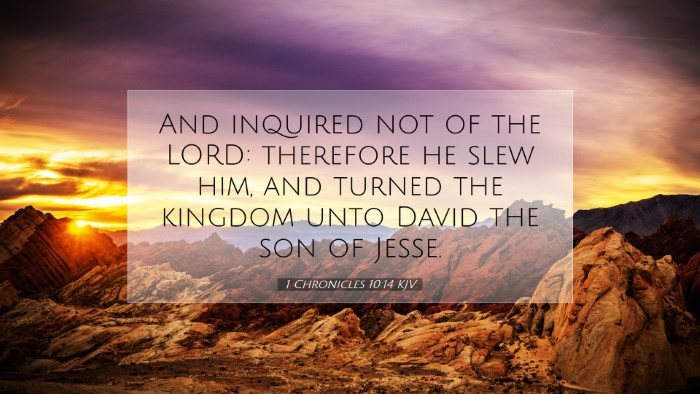1 Chronicles 10:14 Commentary
Verse: "And inquired not of the Lord: therefore he slew him, and turned the kingdom unto David the son of Jesse." (1 Chronicles 10:14, KJV)
Introduction
The verse of 1 Chronicles 10:14 marks the conclusion of King Saul’s tragic story. The context of Saul's reign, his descent into despair and disobedience, is crucial to understanding this passage. In these few words, we encounter the ramifications of Saul’s choices, revealing his spiritual failure in contrast to David, who would succeed him. This commentary draws insights from Matthew Henry, Albert Barnes, and Adam Clarke to illuminate the significance of Saul’s neglect and the sovereignty of God in establishing David as ruler.
Exegesis of the Passage
This verse succinctly encapsulates the spiritual and political transition captured in the preceding chapters. The history encapsulated in 1 Chronicles serves as a reminder of God's faithfulness in fulfilling His purposes, even in the face of human failure.
Matthew Henry's Insights
Matthew Henry provides a comprehensive examination of Saul’s failure to inquire of the Lord. He emphasizes that Saul’s inquiries had transformed from seeking divine guidance to relying on himself and ultimately on mediums and sorcery. This pivotal decision led to disastrous consequences. Henry notes:
- The Importance of Seeking the Lord: Saul neglected to seek God's counsel, resulting in his downfall. This neglect illustrates a fundamental truth: the necessity of divine guidance in leadership.
- The Severity of Disobedience: The verse highlights God's judgment against Saul as severe but just, reflecting the importance of obedience to God's commands. This theme resonates throughout Scripture, where disobedience leads to divine disfavor.
Albert Barnes' Observations
Albert Barnes provides insight into the political implications of Saul's rejection by God. He points out that Saul’s inability to inquire of the Lord indicated a spiritual disconnect that ultimately resulted in the overthrow of his reign. Barnes articulates:
- The Role of Divine Appointment: The passage illustrates that God, as sovereign, has the ultimate authority to appoint and dispose of rulers according to His divine will.
- David’s Anointing: In acknowledging David as Saul’s successor, the verse signifies a shift not only in governance but also in the spiritual direction of Israel. David’s heart for God set the stage for a significant contrast between the two leaders.
Adam Clarke's Commentary
Adam Clarke adds depth to our understanding by examining the Hebrew terminology used in the original text. He explicates the failure to “inquire of the Lord,” stressing the grave implications of Saul’s choices:
- The Nature of Inquiry: Clarke elucidates that the inquiry meant a deep and earnest search for guidance, reflecting Saul's lack of genuine submission to divine authority.
- Theological Implications: This failure was a manifestation of Saul's pride and self-reliance, ultimately leading to his tragic end. Clarke calls readers to reflect on their own lives, contemplating whether they prioritize God’s guidance.
Theological Reflections
The implications of 1 Chronicles 10:14 extend beyond Saul's immediate context; they challenge contemporary believers regarding leadership, spiritual fervor, and obedience. The following reflections emerge:
1. The Necessity of Seeking God
In today’s world, leaders in the church and beyond must prioritize seeking God’s direction. Saul's tragic example serves as a grave warning against self-sufficiency and neglect of spiritual disciplines.
2. The Consequence of Disobedience
Saul’s life demonstrates the inevitable consequences of disobedience. In what ways might leaders today be sidelined by their refusal to submit to divine authority?
3. God’s Sovereignty in Leadership
This passage affirms that God is actively involved in human affairs. His sovereignty ensures that even amidst human failures, He raises up leaders according to His plans. David's anointing signals hope for Israel but also serves as an essential and timeless reminder that God honors those who seek Him.
Conclusion
1 Chronicles 10:14 serves as a pivotal lens through which to view the character of God and the significance of faithful leadership. By comparing Saul’s ultimately tragic path with David's anointed rise, we are compelled to reflect on our own lives and the imperative of seeking the Lord earnestly. The insights from the commentaries of Matthew Henry, Albert Barnes, and Adam Clarke present a rich tapestry of understanding that underscores God’s call to obedience and reliance upon Him. As we learn from Saul’s story, let us commit to diligent prayer and the pursuit of divine wisdom in our own endeavors.


